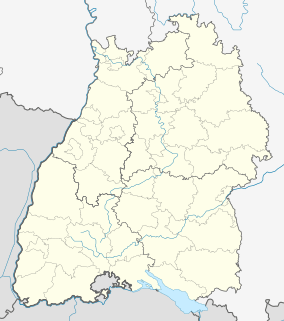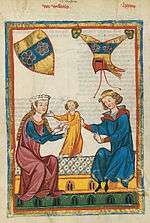Wiesloch
Wiesloch (German: [ˈviːslɔx], locally [ˈvɪslɔx]), is a city in Germany, in northern Baden-Württemberg. It is situated 13 kilometres south of Heidelberg. After Weinheim, Sinsheim and Leimen it is the fourth largest city of the Rhein-Neckar-Kreis and is in the north-central area near Heidelberg with its neighbouring town Walldorf with which it shares Wiesloch-Walldorf station. Also in the vicinity of Wiesloch are the cities and towns of Dielheim, Malsch (bei Wiesloch), Mühlhausen, Rauenberg and Sankt Leon-Rot.
Wiesloch | |
|---|---|
 Coat of arms | |
Location of Wiesloch within Rhein-Neckar-Kreis district   | |
 Wiesloch  Wiesloch | |
| Coordinates: 49°17′39″N 08°41′54″E | |
| Country | Germany |
| State | Baden-Württemberg |
| Admin. region | Karlsruhe |
| District | Rhein-Neckar-Kreis |
| Subdivisions | Kernstadt, 4 Stadtteile |
| Government | |
| • Lord Mayor | Franz Schaidhammer (Ind.) |
| Area | |
| • Total | 30.262 km2 (11.684 sq mi) |
| Elevation | 130 m (430 ft) |
| Population (2018-12-31)[1] | |
| • Total | 26,758 |
| • Density | 880/km2 (2,300/sq mi) |
| Time zone | CET/CEST (UTC+1/+2) |
| Postal codes | 69168 |
| Dialling codes | 06222 |
| Vehicle registration | HD |
| Website | www.wiesloch.de |
During the reformation of the area in the 1970s Wiesloch's inhabitants exceeded 20,000. Wiesloch became a "Große Kreisstadt" on 1 January 1973, when Altwiesloch, Baiertal, Frauenweiler and Schatthausen were joined with the town of Wiesloch to form the present municipality.
Partnerships
Wiesloch is a twin town of:
- Sturgis, St. Joseph County, Michigan, US
- Amarante, Portugal
- Fontenay-aux-Roses, France
- Ząbkowice Śląskie, Poland
History
The settlement that is now Wiesloch town centre originated during the expansion of silver mining in the vicinity in the 10th century.[2]
Fossil site
The fossil remains of the oldest hummingbird found to date, Eurotrochilus inexpectatus, were found in a clay pit at Frauenweiler. This bird lived during the Early Oligocene (30 mya), when the area had a humid, subtropical climate similar to the northern Caribbean today.[3]
Emperor Henry IV
In 1077, Emperor Henry IV locked more than 100 of his enemies in the early church at Wizinloch (as the place was then known) on the site of the present Reformed church (Stadtkirche) and burnt the building down.[4]
Battles
There were three battles near Wiesloch, the Battle of Mingolsheim on 27 April 1622 (during the Thirty Years' War), the 1632 Battle of Wiesloch on 16 August 1632, (during the same war) and the 1799 Battle of Wiesloch on 3 December 1799 (during the War of the Second Coalition).
Wiesloch was attacked on 28 January 1689 by French troops under Ezéchiel du Mas, Comte de Mélac, during the Nine Years' War, and was almost completely burnt down and destroyed.

Bertha Benz
The city pharmacy in Wiesloch was the first "filling station" in the world, because Bertha Benz stopped there on 5 August 1888, on the first long distance car trip, to refill the tank of her automobile, which her husband Karl Benz had invented. She was supplied with ligroin by the apothecary Willi Ockel.
In 2008, the Bertha Benz Memorial Route was officially designated an industrial heritage route, following Bertha Benz's route on the world's first long-distance journey by automobile. It is a 194 km signposted circuit from Mannheim via Heidelberg and Wiesloch to Pforzheim in the Black Forest, and back.

The Minnesinger von Wissenlo
The Codex Manesse includes four sophisticated Middle High German lyrics in the tagelied genre ascribed to the Minnesinger von Wissenlo (meaning "minnesang poet from Wiesloch").[5][6] The identity of the Minnesinger von Wissenlo is not known, but the poet is conjectured to be Heinrich Swendinger von Wissenloch, who lived in the second half of the 13th century.[7] An illustration titled von Wissenlo in the Codex Manesse shows a lady, a child, and a knight, and includes an escutcheon which does not match that of the Von Wissenloch family.[8]
There are two statues of the Minnesinger von Wissenlo in Wiesloch town centre: one, by Hatto Zeidler from 1978, is in the square by the united protestant church (Stadtkirche) and shows the poet playing the lyre;[9] the other, an equestrian statue on a tall column, is part of a group by Karel Fron that was erected in the market square near the town hall in 1988.[10]
Geography
Wiesloch is situated partly on the southern foothills of the Odenwald, partly in the Rhine Valley, and partly in the Kraichgau. Five brooks flow through Wiesloch: the Leimbach, the Gauangelbach, the Waldangelbach, the Ochsenbach, and the Maisbach.
Economy
MLP AG, a large German broker of personal finance services, is headquartered at Wiesloch. Wiesloch also hosts the world's largest printing press manufacturing site, operated by Heidelberger Druckmaschinen.[11] Other large companies in the close vicinity are HeidelbergCement, the central cool store warehouses for the REWE Group supermarket chain, and the global headquarters of SAP SE.
"MetropolPark Wiesloch-Walldorf" is the brand name for the commercial and industrial business park surrounding Wiesloch-Walldorf railway station.
Leisure
The open-air Leimbach Park and Wiesloch Feldbahn and Industrial Museum are in the region surrounding the joint railway station.
References
- "Bevölkerung nach Nationalität und Geschlecht am 31. Dezember 2018". Statistisches Landesamt Baden-Württemberg (in German). July 2019.
- Ludwig H. Hildebrandt: Mittelalterliche Urkunden über Wiesloch und Walldorf, Ubstadt-Weiher 2001, p 110 (in German)
- World's oldest hummingbirds
- Ludwig H. Hildebrandt: Mittelalterliche Urkunden über Wiesloch und Walldorf, Ubstadt-Weiher 2001, p 114, no. W20 (in German)
- Nu wol ûf, ritter, ez ist tac! – Die Tagelieder des von Wissenlo booklet accompanying a music CD (same title) by Freiburger Spielleyt, distributed by Verlag der Spielleute. (The booklet includes full texts of the four known lyrics by Von Wissenlo) (in German)
- Carl von Kraus: Deutsche Liederdichter des 13. Jahrhunderts, Part I Text, pp 593ff, and Part II Commentary, pp 644ff, Tübingen 1978 (in German)
- der Minnesänger von Wissenlo on the official civic site for Wiesloch (in German)
- Karl Zangemeister: Die Wappen, Helmzierden und Standarten der Grossen Heidelberger Liederhandschrift (Manesse-Codex), p. 18, Görlitz 1892; available to download from Heidelberg University Library at http://digi.ub.uni-heidelberg.de/diglit/Zangemeister1892 (in German)
- Article about the statue, with photograph, on the official civic site for Wiesloch (in German)
- Article about the group, with photographs, on the official civic site for Wiesloch (in German)
- Heidelberger Druckmaschinen annual report 2006/2007, p. F-5 Archived 11 July 2011 at the Wayback Machine
External links
- Official website of the city of Wiesloch
- Wiesloch – Industrial Center of the Heidelberg Area South (WebCite archive)
| Wikimedia Commons has media related to Wiesloch. |